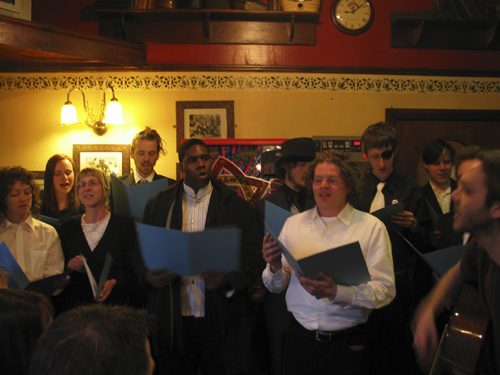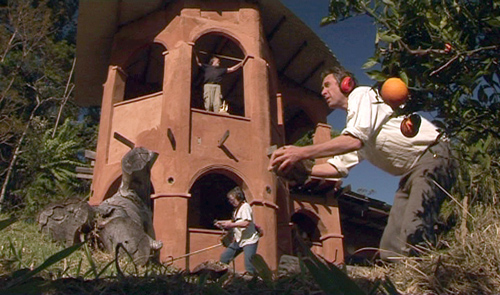 |
Tellervo Kalleinen/Oliver Kochta-Kalleinen: Complaints Choir of Birmingham (documentation) 2005
While Naeem Mohaiemen presents and displays protest in a political context Tellervo Kalleinen and Oliver Kochta-Kalleinen orchestrated a songlike form of protest referring to and bearing on our everyday complaints. The concept of their choirs is based on the Finnish expression “Valituskuoro”, meaning a situation where a lot of people are complaining simultaneously. Birmingham, by some considered “the arsehole of England”, seemed the perfect place for the start of the project in 2005. By flyers and small posters people interested in voicing their complaints publicly were invited to become part of the project, first by studying and rehearsing their parts with a local musician, then by performing in public. In the aftermath of the unexpected success the Complaints Choir of Birmingham, Kalleinen and Kochta-Kalleinen have been invited to initiate complaints choirs all around the globe. Hong Kong, Philadelphia, Singapore, St. Petersburg, Chicago, Helsinki, Buenos Aires and, very soon, Zurich can be enumerated as some of the 80 cities where the choirs that no longer can be solely conducted by Kalleinen and Kochta-Kalleinen themselves performed in public. The concept is open and continuously documented on Youtube. The choirs serve as a means to voice apparently subjective problems within a temporary community, focusing on multiplicity and rendering the unheard-of discernable. An experience impressively proving that every matter or concern is important and that most of the issues do concern all of us.
http://www.complaintschoir.org/

Tellervo Kalleinen/Oliver Kochta-Kalleinen: The Making of Utopia, 2006
“How can utopia be created?” is the ironic title of this video. It can be called ironic since one of the persons interviewed in the movie clearly states that utopia never can be realized. What one can do, however, is to try to create a utopian society geared toward its ideal. One does not grow into such a community like one normally grows into a family, one has to build such a community. Thus, the utopian community emphasizes what characterizes all communities and what increases their appeal compared to established society: One can and wants to participate, one is engaged in its activities, one can choose the people one wants to live twith, rules are established according to which one lives, and one tries to find alternatives to the common concepts of consent and dissent.Tellervo Kalleinen and Oliver Kochta-Kalleinen start out from the assumption that utopian communities are “the conscience of all societies” (George Kateb). They emphasize, as one of the interviewed persons states, that one can make “social experiments”. “It is important to see that there are alternatives to the existing circumstances in life.” This is why both artists try to establish contacts to alternative communities and to find out how the people gap the difference between the utopian vision and reality. The aim of the project was to have the communities represent themselves in some kind of movie. They chose four different eco-communities in Australia that some of them have been in existence for more than 30 years. They invited community members to a workshop to help writing the screen script and make the movie, afterwards the protagonists comment on the scenes. Thus, the title “The Making of Utopia” literally refers to the “making” of the film itself.
http://www.ykon.org/kochta-kalleinen/utopia.html
 |
|
|
 |

